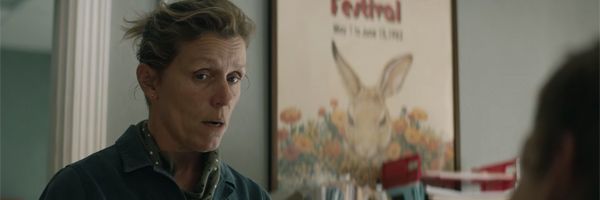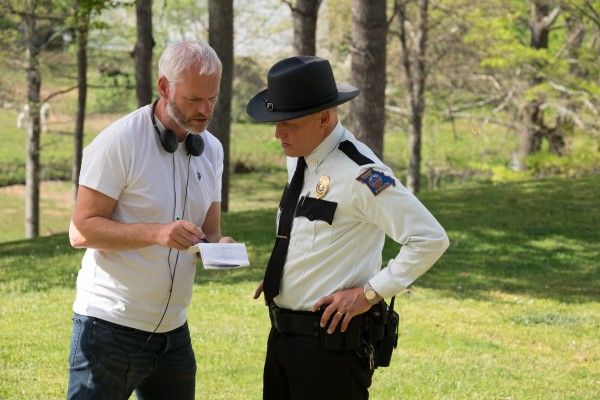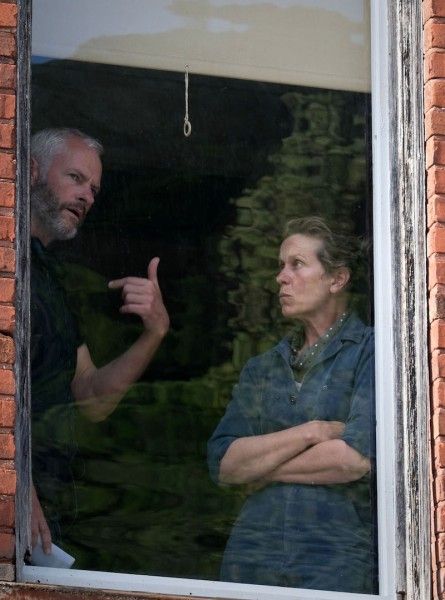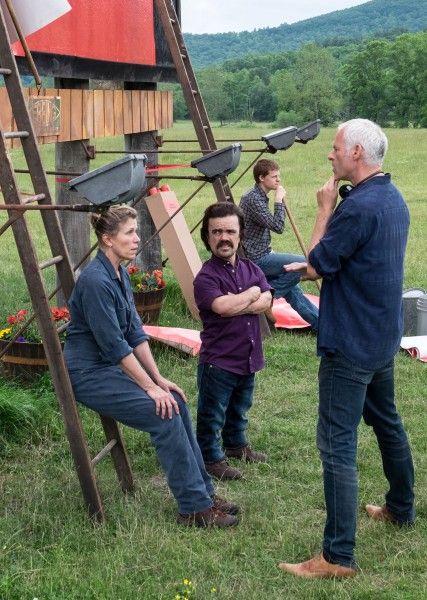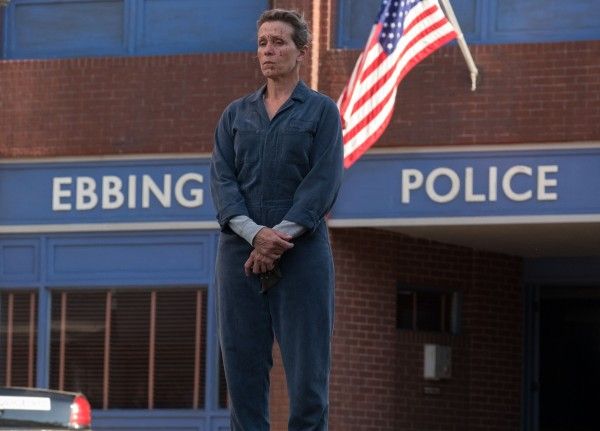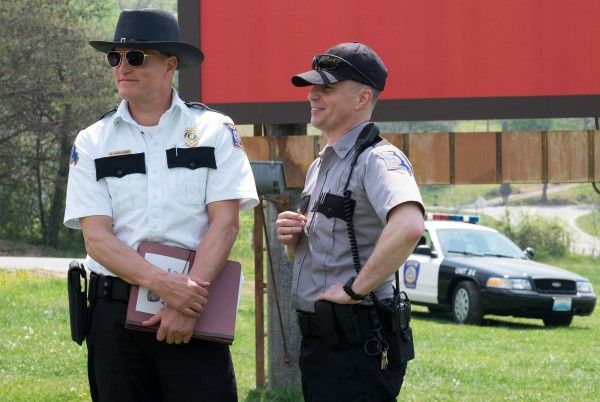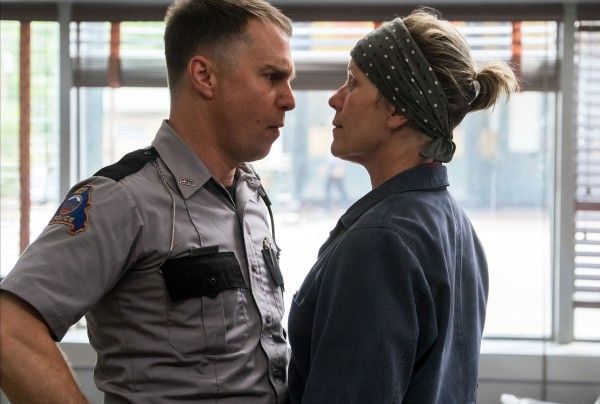The darkly comedic drama Three Billboards Outside Ebbing, Missouri, from writer/director Martin McDonagh, tells the story of Mildred Hayes (Frances McDormand, in a performance that is a master class in acting at its finest), who makes the decision to paint three billboards leading into her town with a controversial message directed at the town’s chief of police (Woody Harrelson). The billboards anger Officer Dixon (Sam Rockwell), who has a penchant for violence, which pushes Mildred even further, in ways that could have disastrous consequences.
During this 1-on-1 phone interview with Collider, filmmaker Martin McDonagh talked about the origin of this film’s story, which started nearly 20 years ago, what he most enjoyed about delving into the character of Mildred, writing the role for Frances McDormand, why Sam Rockwell is his muse, how much he had to cut from the film, and why he only wants to make one movie every four years.
Collider: I loved this movie, and Frances McDormand is just so terrific in it! When you’re directing someone giving a performance like that, do you ever have to remind yourself that you’re supposed to be directing them and not just watching them?
MARTIN McDONAGH: It’s always about attention to detail for me, but she’s so outrageous, both the character and Frances’ playing of it, that you do break down and smile. There was a lot of laughter on set. For a story that’s as dark as this is, it was one of the most fun sets I’ve ever been on.
You’ve said that this idea started for you while you were traveling across America, nearly 20 years ago, and you saw an angry message on billboards. Why did that stick with you long enough that we’re getting to see this film, so many years after you saw that?
McDONAGH: Because the message was very similar to what Mildred’s message is, at the start of the film, the idea of the anger and the pain behind that was something that I could never really get out of my head. I didn’t know it would be a story or film, but the rage that put a bunch of billboards like that up was palpable and stayed with me. Once I decided, in my head, that it was a mother, everything fell into place. I didn’t plot the film, at all, before starting. With the idea of this strong woman being so outraged and brave to put something up like that, everything wrote itself, after that.
Did you ever find out the true story behind the billboards you came across?
McDONAGH: No. It was in the days before Google, or any of those things. I’d be intrigued to know what the outcome of that was.
I love that you were conscious of the fact that, while your work as a playwright had dealt with strong female characters, you hadn’t centered any of your films around them, so you created Mildred. What did you most enjoy about exploring and delving into Mildred?
McDONAGH: There’s something very, very freeing about writing a woman this strong and this outrageous. Because I didn’t plot it out beforehand, I never knew what she would do, from scene to scene, and I think it probably shows in the film. I didn’t know any of that was going to happen, but I had a suspicion that it wouldn’t end well. There was something joyful about following a person like that, through a town and through a state. The level of self-confidence in a person like that, absolutely taking no prisoners and taking no shit, is so freeing. It’s how we would all want to behave in life, if we had the guts to. There’s something joyful about following someone like that, but it’s also surprising, too, because you never know how your other characters are going to react to that. Hopefully, we get things right and we don’t paint everyone as simple black and white figures. One of my favorite scenes is when [Woody and Frances] are in the police station, and it goes from this confrontational and funny head-to-head, where they’re both locking horns and both believe they’re completely in the right, to tenderness and humanity. I didn’t know that that was going to happen, as much as the audience isn’t going to know that’s going to happen. Part of it is setting up these very contrary characters with totally their own people, but then trying to strip away those layers and show that one isn’t all good while one is all bad.
My favorite moment in the film is when Mildred drives by the newscaster and gives her a piece of her mind.
McDONAGH: Frances hit every beat of that speech so perfectly. It was funny, we had to do that seven or eight of nine times, just to get the shot. Frances did it perfectly, but she had to pop out, just at the right time while the car was moving, for us to capture it on screen. I think we nailed it on the eighth go.
You wrote Mildred for Frances McDormand, so did you get a yes from her before you wrote it, or did you just decide you weren’t going to take no for an answer?
McDONAGH: I never really tell anyone what I’m writing beforehand because I usually don’t know what it will be. I had her voice in my mind and the idea of Frances, but I didn’t get in touch with her. The script was finished about eight years ago, but I just put it away and didn’t even contact Frances until we were in the position of making it. I didn’t want to waste her time. So, maybe four or five years ago, once we knew this was going to be our next project, I sent it to her and didn’t really tell her anything about it. I think I just told her to read it and see what she thought. And then, we met and she had loved it, and I love her, so we both jumped in. If she’d said no, we would have been completely screwed. I can’t think of anyone else. Whoever else it could have been, it would have been a way more Hollywood version, and that wasn’t what I ever wanted anyway.
At this point, is Sam Rockwell your muse?
McDONAGH: Yeah, I think so. I’ve always got him in my head when I’m writing an American character of that age. There’s something freeing about having Sam in your head when you’re writing. He can play the darkest of characters and the nicest of characters, too, and both in one person, to a degree. This guy isn’t nice, but he’s certainly someone capable of change and of hope. So, if anyone has ever been a bit of a muse than I think it’s Sam. I’m so glad he’s finally getting some recognition and they’re talking about him at this awards season. It’s crazy that he didn’t get that for Moon or Confessions of a Dangerous Mind, or any of the great stuff he’s been in, in the past.
Are you someone who thinks about the runtime of a film before you shoot, so that you don’t overshoot too many scenes that you’ll have to cut later, or did you have to cut a lot out of this film?
McDONAGH: I try to naturally keep things to a manageable storytelling length, which is about two hours, so you try to cut out anything extraneous. By the time we started shooting the script, I know enough about scripts to not have a lot of extraneous stuff in there, anyway. We still probably cut out six or seven scenes that, at the time, I thought were really necessary, but didn’t turn out to be, in the edit. They’re all great scenes, and there’s some really great stuff with Sam, but some of them were particularly funny and they hurt the balance of what we ended up with, which was a good balance between the sadness and the tragedy and the humor. We didn’t want to make it more of a comedy than the tragedy allowed.
I absolutely loved In Bruges, Seven Psychopaths, and now Three Billboards, but you’ve only made three films. Are you going to jump into making movie #4, sooner rather than later? Do you know what your next film will be?
McDONAGH: Oh, god, no! I’m way too lazy for that! I like traveling and I like not being part of the film world. Especially when you’re in the middle of a junket, you’re thinking, “I’m not doing this again for four years!” I have one script that’s ready to go, and I want to write a couple more next year, so that the year after, I’ll have a choice of two or three things to go with next. The most important thing for me, because I’m so happy with this film, is that I don’t want the one after to be anything lesser. That’s about taking time and finding the right story and being in a happy place in life where you can joyfully tell a story. I’m not really into the fame side of things, so I’m very happy with making a film every four years or so.
Because you do write your characters so specifically to actors that you think of for the role, is there an actor or actress that you haven’t worked with yet, but you’d love to write something specifically for them?
McDONAGH: There are a lot. I’d be weary of saying any names, so as not to alienate anyone. I loved The Master a lot. I’m not going to get to work with Daniel Day-Lewis, but Joaquin Phoenix is one of the best around, I think. There are a lot of actresses, too, that I’d like to work with. I also like this little repertoire company of actors that I’ve started building up. I could happily do something very different with Fran, Woody and Sam again.
What do you most enjoy about working with actors?
McDONAGH: I love actors. Part of that is my theater background and being a writer who cares about performance. Actors have usually chosen their profession because they have a dream of doing it and they want to express something about the world. That’s the same thing that I have with writing. Most of the good actors get into it for those reason, rather than for reasons of fame or fortune, or anything like that, and that’s where I’m coming from, as a storyteller. It’s about finding like-minded artists, like Sam and Woody and Fran and John Hawkes and Peter Dinklage, who are great at what they do, but also care so much about acting and movie-making and theater. It’s just great to be around. Now, with this one, I’m finally really comfortable being on a set and being a director. I was always comfortable with the writing side, but it was a little bit nerve-wracking on the first two movies. There was a fear of not knowing if you’re going to be good enough, and those sorts of things. With this one, it felt like I’d learned enough to be able to help and to direct properly.
Your movies all have a very tricky tone to them, in the sense that they can be very brutal and violent, but they also have a real heart to them. Does it help when you work with the same actors and know their voice and you can write specific characters to their strengths?
McDONAGH: Yeah, very much so. Particularly with Frances, Woody and Sam, I knew I wasn’t going to have to worry about them sentimentalizing the characters or patronizing them. With Frances, I didn’t want her to be too lovable or open to the typical Hollywood character traits. That was never a path that we wanted to go down for her. Similarly with Sam, I knew he would portray the darkness and the brutishness of that character, but also not sentimentalize the change while you still believe the change, as much as you believe the brutishness.
Three Billboards Outside Ebbing, Missouri is now playing in select theaters, and opens nationwide throughout November.

